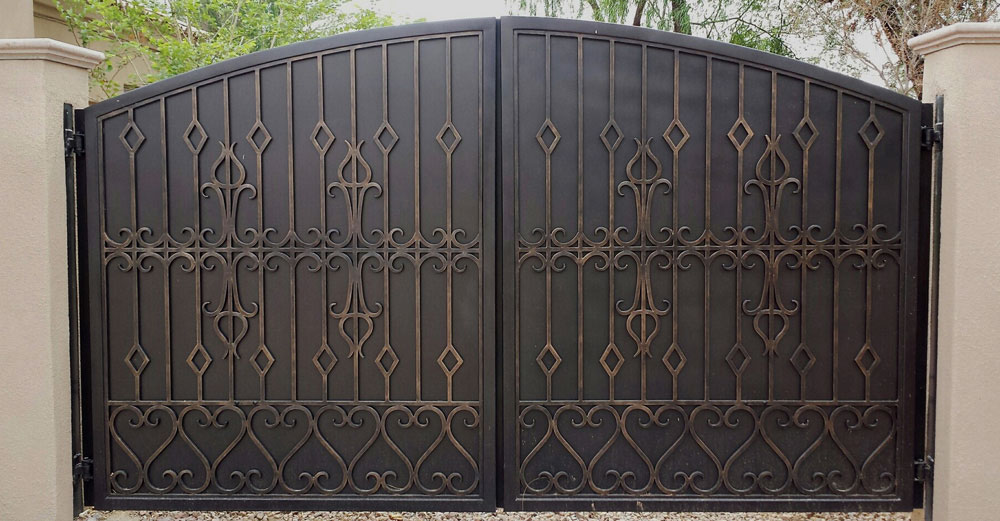If you’re searching for “wrought iron vs. steel gates” you’re probably trying to decide which you want for your home or business. Both have pros and cons, but which is best? Read on to find out which will work best for your commercial or residential property. In the event you are like most people, not a full-fledged gate aficionado and searching for new metal gates you may be confused when encountering terms such as steel gates and wrought iron gates. It is common to wonder the difference, because they are both metal. Although both are metal, they do have differences, let’s take a look.
WHAT IS THE DIFFERENCES BETWEEN STEEL GATES AND WROUGHT IRON GATES?
Because metal gates are generally advertised as the same thing, being metal, the differences are not clearly obvious with modern manufacturing processes. However, from a scientific perspective, there are some differences that will assist you in determining the proper type of gate for your situation. For starters, steel is an alloy while iron is an element found on the Periodic Table. Basically, steel is a man-made metal combining carbon and iron, while iron is a raw material that is extracted from the ground.
Of course, if you are not big on Chemistry, you could be questioning why knowing the science behind the two metals help determine which gate to choose. Below is an outline of characteristics between each type to highlight the differences. This enables you to ask the proper questions when shopping for your metal gate.
WROUGHT IRON GATES
Iron gates are created from the raw element (iron) after being excavated from the earth. Iron has been used for centuries all around the world. Although, traditional wrought iron forged by civilizations using a hammer and an anvil do not exist in a modern commercial sense. However, the work is still done by a few establishments, which often charge premium prices. But, for the past century steel has been the preferred metal due to being rust-proof, stronger and simply being superior.
Although, the major change from iron to steel is not to suggest manufacturing no longer uses iron. This is particularly true with manufacturing of metal gates, where steel may be used for the railings, posts, pickets and frames, the manufacturer may prefer to use sand-casted iron for the gate frame caps and posts, panel brackets, final tips, and various visual elements. Steel is no doubt more wear resistant and stronger, making it the ideal material for stamping, rolling and cutting. However, sand-cast iron provides manufacturer’s the ability to create more visual details, providing an appealing gate, in combination with a strong frame.
STEEL GATES
Steel gates are the most common type of metal gates manufactured today, followed by aluminum. As previously mentioned, the reason being steel provides a rust-proof and stronger frame. Although, material quality used depends on the manufacturer. You should question the dealer about what type of metal the gate is fabricated with. Many gate fabricators create gates from a thinner type of stamped steel with picket tops pressed into flat pointed shapes, which have no iron elements. This process is cheaper to manufacture, making it a preferred option on a small budget. However, it does not have the high-quality appearance that iron tip gates provide. Generally, for an additional charge a manufacturer will offer final tip upgrades, but many of these are fabricated from die-cast or plastic with each being applied by pressure. Therefore, to get the best appearance possible you would have to align each picket to be straight and even. When dealing with several feet of fencing, this can be challenging.
Although, this is not suggesting these type of steel gates is poor quality, necessarily. Because they are mostly fabricated from steel, they provide strength while being economical. They just do not have the stunning appearance achieved with iron finishing’s on a steel frame.
Because of this, reading the fine print becomes an important step, along with asking questions when shopping for a metal gate. We hope our explanation has helped to provide a clear understanding between the differences between iron and steel gates. As a metal gate is not a cheap investment, you should be well informed for making your decision.
CUSTOMIZED METAL GATE FABRICATIONS
Are you searching for a custom fabricated wrought iron or steel gate in the Scottsdale, Arizona area? Victory Metal Works is an experienced fabricator and offers custom wrought iron gate fabrication. We will help you develop a custom design for your metal gates, fabricated it with the highest quality metal and fabrication techniques, and then professionally install it at your home, office, or any property you wish. We design, fabricate, and install both custom single gates and custom double gates.
Start your order by giving us a call at 480-584-6220
SCHEDULE A FREE CONSULTATION TODAY!
Victory Metal Works is Arizona’s leading manufacturer of custom wrought iron Entry Doors, Gates, Railings, Fences, Hardware and much more in Scottsdale, Paradise Valley and the Greater Phoenix area. Our experience in the construction industry allows us to make your dreams become a reality. Call us at 480-584-6220 to get your next project started today!




